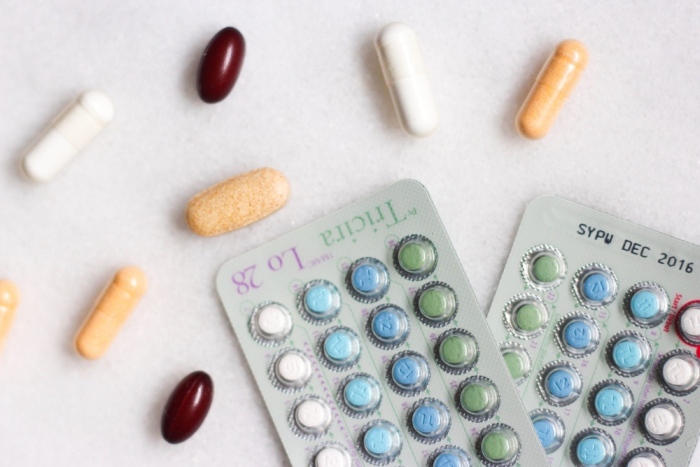Nutrients depleted by Birth Control Pill
The birth control pill (BCP) is often used as a treatment option for endometriosis, usually taken continuously to stop the menstrual cycle. The aim is to halt further development of the disease.

However, taking the BCP can deplete much needed nutrients and vitamins that are vital to good health. Ideally, it is advised to come off the pill and try to get your natural hormones back in balance.
While the BCP can help suppress some symptoms of your endometriosis, your hormones are striving to sustain their normal balance. Taking drugs then throws a curve-ball and upsets your body, this then causes side-effects as your body becomes out of balance.
You may be suffering side effects and not really putting two and two together, possibly thinking that what you are suffering are symptoms of endometriosis. Some of the side effects may include nausea, weight gain, visual changes, decreased libido, headaches, breast tenderness and bloating – as you can see, there are comparisons to endometriosis symptoms.
You may not suffer any of these side effects, and you may decide to come of the BCP based on going more natural and reduce your use of any drugs. Fortunately, you can stop the BCP at any time and there is no need to wean off like you would with other drugs.
However, it is a good idea to prepare for three months to support your body and ensure your body has all the nutrients it needs, as the pill can deplete your system.
Coming off the BCP can cause a detox as your body clears itself of unwanted toxins and you need to support your body to aid in the detox process.
These are the nutrients you need to support when you are using the birth control pill, as well as when preparing to come off the pill
1. Vitamin B6
Symptoms and Problems: Depression, sleep and skin problems, increased cardiovascular disease risk, confusion, anxiety, fatigue
Function in body: Enzyme, protein metabolism, Red blood cell production, reduces, homocysteine, nerve & muscle cells, DNA/RNA, B12 absorption, immune function
Food sources: Poultry, tuna, salmon, shrimp, beef liver, lentils, seeds, nuts, avocados, bananas, carrots, brown rice, bran, wheat germ, whole grain flour
2. Folic Acid
Symptoms and Problems: Anaemia, immune function, fatigue, insomnia, hair, high homocysteine, cardiovascular disease, birth defects, cervical dysplasia
Function in body: Mental health, infant DNA/RNA, adolescence & pregnancy, with B12 to regulate RBC production, iron function, reduce homocysteine
Food sources: green vegetables, black-eyed peas, lentils, beans
3. Vitamin B1
Symptoms and Problems: Depression, irritability, oedema, heart, age-related cognitive decline, Alzheimer’s, fatigue
Function in body: Carbohydrate conversion, breaks down fats & protein, digestion, nervous system, skin, hair, eyes, mouth, liver, immune system
Food sources: whole grains, brown rice, wheat germ, bran, Brewer’s yeast, blackstrap molasses
4. Vitamin B2
Symptoms and Problems: Anaemia, decreased free radical protection, cataracts, poor thyroid function, fatigue, muscle weakness, elevated homocysteine, nerves
Function in body: Metabolism, carbohydrate conversion, breaks down fats & protein, digestion, nervous system, skin, hair, eyes, mouth, liver
Food sources: Brewer’s yeast, almonds, organ meats, whole grains, wheat germ, mushrooms, green vegetables
5. Vitamin B3
Symptoms and Problems: Cracking, scaling skin, swollen tongue, digestive problems, diarrhoea, confusion, anxiety, fatigue
Function in body: Energy, digestion, nervous system, skin, hair, eyes, liver, eliminates toxins, sex/stress hormones, improves circulation
Food sources: Beets, Brewer’s yeast, poultry, fish, seeds, nuts
6. Vitamin B12
Symptoms and Problems: Anaemia, fatigue, weakness, constipation, loss of appetite/weight, numbness and tingling in the hands and feet, depression, dementia, poor memory, oral soreness, increased cardiovascular risk
Function in body: Healthy nerve cells, DNA/RNA, red blood cell production, iron function
Food sources: Fish, meat, poultry, eggs
7. Vitamin C
Symptoms and Problems: Muscular and nervous irritability, muscle spasms, muscle cramps and tetany, tooth decay, periodontal disease, lowered immune system, easy bruising, poor wound healing, depression, possibly hypertension
Function in body: Enzyme activation, second messenger roles (transmitting hormonal information), blood clotting, cell and cell organelle membrane function, nerve impulse transmission and muscular contraction, tone and irritability
Food sources: Supplementation, broccoli, Brussel sprouts, cantaloupe, cauliflower, citrus, guava, kiwi, papaya, parsley, peas, potatoes, peppers, rose hips, strawberries and tomatoes
8. Magnesium
Symptoms and Problems: Appetite, nausea, vomiting, fatigue cramps, numbness, tingling, seizures, asthma, osteoporosis, heart spasms, heart rhythm, cardiovascular problems, personality changes, PMS
Function in body: Involved in 300 biochemical body reactions, muscle/nerve function, heart rhythm, immune system, strong bones, regulates calcium, copper, zinc, potassium, vitamin D
Food sources: Green vegetables, beans, peas, nuts, seeds, whole unprocessed grains
9. Selenium
Symptoms and Problems: Destruction to heart/pancreas, sore muscles, fragility of red blood cells, reduced antioxidant protection, immune system
Function in body: Antioxidant, works with vitamin E (thins blood), immune function, prostaglandin production
Food sources: Brewer’s yeast, wheat germ, butter, cold water fish, shellfish, garlic, whole grains, sunflower seeds, Brazil nuts
10. Zinc
Symptoms and Problems: Growth retardation, hair loss, diarrhoea, impotence, eye & skin lesions, loss of appetite, taste, weight loss, would healing, weak immunity, mental lethargy
Function in body: Supports enzymes, immune system, wound healing, taste/smell, DNA synthesis, normal growth & development during pregnancy, childhood and adolescence
Food sources: Oysters, poultry, beans, nuts, seafood, whole grains
If you are wanting to come off the birth control pill and looking for more natural ways to manage endometriosis you will find a host of tips and advice in the articles you will find HERE





